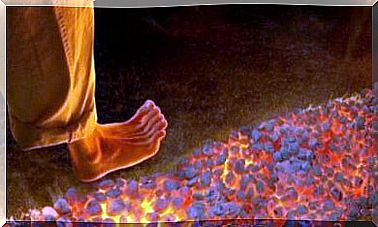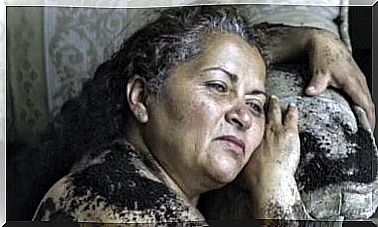Body Awareness Helps You Understand Your Emotions

As a society, we attach great importance to our thoughts and rational selves. Body and feeling are often pushed aside. Fortunately, people today are more open to concepts like emotional intelligence. Yet many people still do not practice body awareness on a daily basis.
What if our bodies were a direct reflection of our emotions? The body plays an important role in building emotions. Understanding that role helps us increase our body awareness and reduce emotional tension.
How do emotions affect body awareness?
Body and emotions go hand in hand. When one speaks, the other answers. Many scientific studies show the influence of emotions on pain and the physical body. Both are in constant contact with each other. Research shows that physical pain and emotional pain activate similar areas of the brain.
For example, not coping with anger or stress at work can lead to jaw tension or muscle cramps. These are unspoken emotions. They stay stuck in your body and wait for you to let them out. Since they cannot manifest themselves, they try to express themselves somehow. Often that expression ends up being tension or physical discomfort.

In fact, your body is a map that helps you identify what you are feeling. You probably noticed that lump in your throat at some point when you were holding something back from your partner. Or did you get a stomachache before an important exam. These are body awareness signals so that you can express your emotions.
Observe your body – it has an emotional message for you
When we ignore our emotions, they turn into pain and physical suffering. What signal is our body trying to give us? Headache, difficulty breathing, exhaustion or a knot in your stomach. Do any of these symptoms sound familiar to you? Although we try to ignore zr, the physical symptoms are still there. The more we ignore them, the more intense they become.
We often try to cover up our pain or sensations with pills. These provide temporary relief, but do not solve the problem. We just put a band-aid on an open wound. If we don’t express them properly, our emotions will still be there. Wouldn’t it be better to listen to the emotional message that our bodies communicate?
Imagine a man who works fifteen hours a day. He is so stressed that he wakes up every morning with muscle cramps in his neck. Despite the pain, he takes a muscle relaxant and continues to work. His body asks him to stop, ease his workload and rest. He needs to look at his body consciousness. Pay attention to your physical pain and you will see what your body needs. If you learn to deal with your emotions, you will also feel much better physically.
Every emotion is related to sensations in the body
Let’s take a closer look at the four basic emotions and the physical sensations they generate. I will also explain how to control your emotions so that they do not turn into intense physical pain.
scared (fear)
This emotion warns us of potential dangers. It also helps us anticipate and protect ourselves from threats. On a physical level, anxiety manifests itself in abdominal pain, body tension, rapid heartbeat, sweating, chest pressure, diarrhea, appetite changes, and insomnia, among other things. These symptoms don’t just occur with anxiety, but they can accompany it. Sometimes this emotion limits us in important ways.

If you suffer from any of these symptoms, you need to ask yourself. Is it fear, or some other emotion you’re feeling? To manage anxiety, it’s best to deal with it as it comes rather than trying to avoid it. For example, if you have to give a presentation in public, practice breathing and relaxation techniques to reduce anxiety and promote body awareness.
angry (anger)
Anger motivates us to act. It helps us defend our rights when we feel wronged. The most common physical symptoms of anger are: physical tension, rapid breathing, tension in the jaw, a rise in body temperature and headache.
These physical sensations can indicate frustration. You must learn to proactively manage your anger. We often suppress our anger, so it’s important to learn how to handle it properly. For example, maybe you’re annoyed because your partner told you you didn’t tidy up your clothes. Instead of yelling or just saying nothing, wait until you’re calm and explain how you feel.
happy (joy)
Joy helps us create bonds with other people. It allows us to share our happiness with others. The physical symptoms of joy are symptoms that we all recognize. Laughter and a sense of lightness. There are people who have trouble feeling this emotion and don’t know how to identify it.
Giving ourselves permission to enjoy the pleasures of life is healthy for our body and mind. If you’re going through a rough time, you can still enjoy a day at the beach or your favorite movie.
Sorrowful (sadness)
This emotion helps us cope with loss and grief. It attracts us and makes us think about the past and how things were. On a physical level, it manifests itself in tears, sweat, tightness in the chest, breathlessness, and loss of appetite. We have all experienced these feelings at one time or another.

If you don’t express your grief, it can become a weight that is too heavy for the body to bear. If you don’t cry or share your pain after the death of a loved one, your grief can lead to physical pain.
Your body is wise and knows what you need
If you manage your emotions in a healthy way, you will be able to hear and understand the messages your body is giving you. You will identify the emotions associated with your physical symptoms and learn to control them so that they do not turn into excruciating physical pain. Remember that your body can help you get to know yourself better if you learn to interpret its hidden messages. When you understand the messages, you can give your body what it needs (rest, attention, exercise, among others).
All you have to do is open your eyes to your physical side. If you do, it will become an important part of your life. Your body is wise and knows what you need. When you take care of your body, you also take care of your emotions. Remember that you will live your whole life with your body. It is worth paying more attention to it and taking better care of it. If you take your time, you will improve your emotional intelligence and your body awareness.









